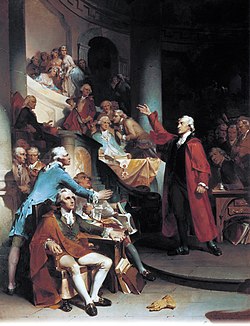Virginia Resolves The Virginia Resolves were a series of resolutions passed on May 29, 1765, by the Virginia House of Burgesses in response to the Stamp Act 1765, which had imposed a tax on the British colonies in North America requiring that material be printed on paper made in London which carried an embossed revenue stamp. The act had been passed by the Parliament of Great Britain to help pay off some of its debt from its various wars, including the French and Indian War fought in part to protect the American colonies. The resolves, primarily authored by Patrick Henry, stated that in accordance with long established British law, Virginia was subject to taxation only by a parliamentary assembly to which Virginians themselves elected representatives. Since no colonial representatives were elected to Parliament, the only assembly legally allowed to raise taxes would be the Virginia General Assembly. Similarly angered, legislatures in nine other colonies later sent delegates to a Stamp Act Congress in New York (October 9–25, 1765) to devise a unified protest against the tax. Virginia was not represented at the meeting as the General Assembly had been earlier dissolved by Lieutenant Governor Francis Fauquier, preventing them from appointing delegates. OriginThe intent of the British Parliament to impose new taxes upon the colonies was well-known, and members of Virginia's House of Burgesses had even retained an agent in London to lobby against such legislation on their behalf. However, these efforts fell on deaf ears, and about May 28, 1765, a ship docked near Williamsburg, Virginia carrying the text of the recently passed Stamp Act, which itemized fifty-five new direct taxes.[1] On May 29, 1765, Patrick Henry made one of his famous speeches before the House of Burgesses to encourage the passage of the resolutions. Henry said "Caesar had his Brutus, Charles I his Cromwell, and George III... (Henry was interrupted by cries from the opposition)... may profit by their example. If this be treason, make the most of it." When Patrick Henry paused after the vibrant portion of the speech, Speaker John Robinson stood and shouted, "Treason! Treason!". Patrick Henry at this point issued a semi-apology. Peyton Randolph later told his young cousin Thomas Jefferson who was standing in the doorways of the House quite frequently. "By God, I would have given 500 guineas for a single vote". The Burgesses generally voted along geographic lines with eastern Virginians opposing the resolves and central Virginians supporting them. Patrick Henry left Williamsburg that night fearing the powerful members of the House would harass him with a warrant. The next day, with Patrick Henry gone and most conservative assembly members back in session, the assembly again set a vote with conservatives trying to have the Resolves struck from the record. However Henry's supporters managed to preserve the first four resolutions with only the more radical 5th Resolution being struck.[2] ImpactGovernor Fauquier initially attempted to stifle the spread of the Resolves, imposing on the printer of the Virginia Gazette not to publish their particulars, despite it being the official government gazette which would ordinarily disseminate acts of the General Assembly to the public.[3] However, this suppression backfired, as the complete text of all seven proposed resolutions was transmitted privately alongside commercial correspondence, ultimately being published in its entirety in the Newport Mercury on June 24.[4] Lacking the context of the official records, readers across the colonies assumed that all seven resolutions had been approved together by the assembly, including those most inflammatory in nature.[5] A direct result of the publishing of the Virginia Resolves was a growing public anger over the Stamp Act, and according to several contemporary sources the Resolves were responsible for inciting the Stamp Act Riots. Governor Thomas Hutchinson of Massachusetts stated that "nothing extravagant appeared in the papers till an account was received of the Virginia Resolves." Later Edmund Burke linked the resolves with the beginning of the opposition to the Stamp Act that would contribute to the American Revolution. Text of the Virginia ResolvesThe text of the Virginia Resolves, as recorded in the proceedings of the House of Burgesses for May 29, 1765:
A fifth resolve was originally adopted with the others on May 29, but was struck from the record the next day in a separate vote by the assembly:
Two further resolves were not brought to a vote in the assembly due to their more extreme nature rendering them unlikely to be adopted. However, they were included in early newspaper reports alongside the official resolves, linking them in popular opinion:[6]
See alsoBibliography
References
|














